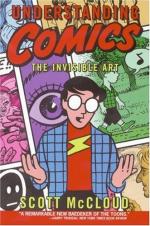
|
| Name: _________________________ | Period: ___________________ |
This quiz consists of 5 multiple choice and 5 short answer questions through Chapter 4, Time Frames.
Multiple Choice Questions
1. When reading comics, how many senses are used between panels?
(a) One
(b) Zero
(c) Five
(d) Four
2. What does McCloud name the two bastions of cartoon art?
(a) Underground and children's comics
(b) Underground and erotica comics
(c) Superhero and children's comics
(d) Erotica and drama comics
3. What transition stays within a scene or idea and requires more closure from the reader in order to find the transition meaningful?
(a) Action-to-action
(b) Non-sequitur
(c) Subject-to-subject
(d) Scene-to-scene
4. What genre cannot exist in comics?
(a) Biography
(b) Epic poetry
(c) None of the above
(d) Satire
5. Who observed that a non-visual awareness occurs when people interact with inanimate objects?
(a) Jack Kirby
(b) Herge
(c) Osamu Tezuka
(d) Marshall McLuhan
Short Answer Questions
1. How are Egyptian paintings read?
2. Comic panels break up which of the following?
3. What transition offers no logical relationship between panels?
4. How long is the screenfold of 8-Deer "Tiger's-Claw" that was discovered by Cortes around 1519?
5. Pictures are ______ information. Writing is _______ information.
|
This section contains 179 words (approx. 1 page at 300 words per page) |

|




